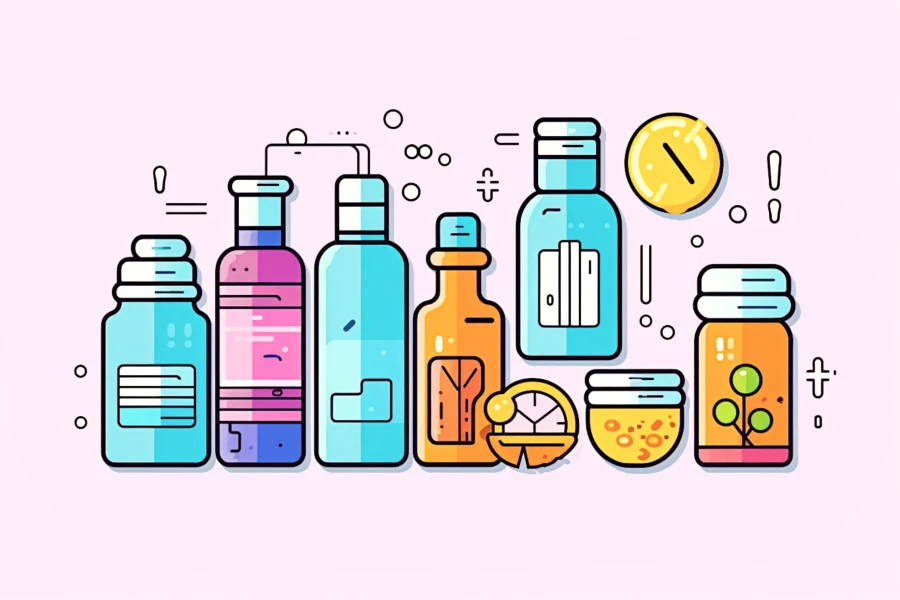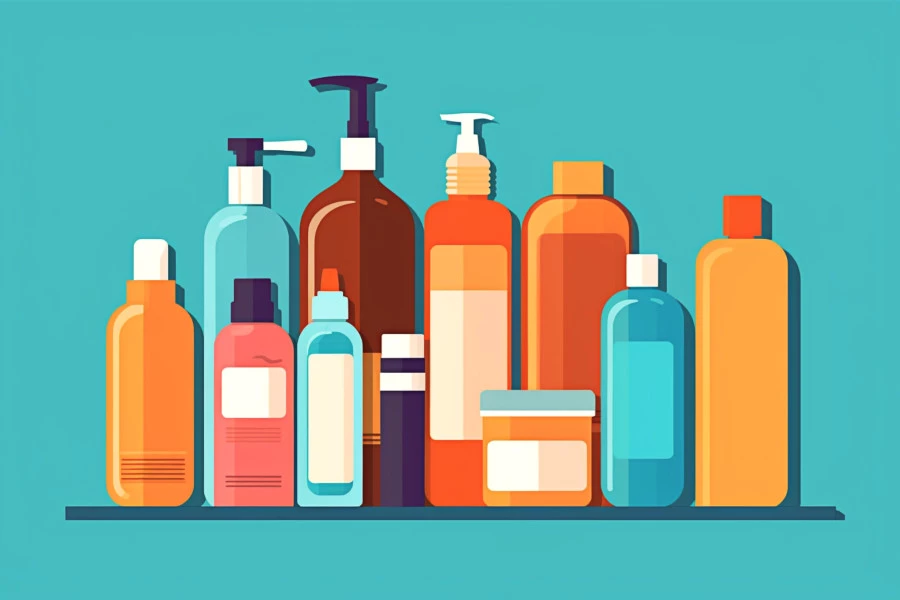Have you ever found yourself lost in the skincare aisle, scanning lists of ingredients on product labels that are as decipherable as ancient hieroglyphics? If so, you’re not alone.
I remember a time when I stood bewildered in the middle of a store, a fancy moisturizer in one hand, and a budget face wash in the other. Both promised radiant skin, but their ingredients lists told a different story.
You know what I’m talking about – parabens, sulfates, synthetic fragrances, and a cocktail of chemicals that are hard to even pronounce. That was when I decided to educate myself about what I was putting on my skin, and that led me on a journey towards toxin-free, clean skincare.
It’s important to understand what we apply to our skin. With increasing awareness about the potential harmful effects of certain synthetic ingredients, more and more people are turning to toxin-free skincare and seeking out clean and natural cosmetics and beauty products.
But why should we choose toxin-free skincare?
Here’s what we’re delving into today:
The Importance of Toxin-Free Skincare
Navigating the world of skincare products can be challenging. Every day, we’re bombarded with products that promise flawless skin, but what do they really contain?

Let’s take a closer look at some of the benefits of toxin-free skincare:
- Health Benefits of Toxin-Free Skincare Products
- What are the Environmental Benefits of Clean and Natural Ingredients?
- Sensitive and Irritated Skin: Cause and Effect
Health Benefits of Toxin-Free Skincare Products
Choosing toxin-free skincare is more than just a trend; it’s about embracing products that are gentle on your skin and beneficial for your overall health. You might be wondering, “What are these health benefits?”
Without potentially harmful chemicals, many skincare products are less likely to cause irritation, inflammation, or allergies. They can help your skin function more naturally, maintaining its elasticity, natural oils, and youthful glow. And the benefits aren’t just limited to your skin; they can impact the overall health of your body, too.
What are the Environmental Benefits of Clean and Natural Ingredients?
Toxin-free skincare isn’t just about individual benefits. When you choose clean skincare, you’re also playing a part in preserving our planet. But how exactly does your choice of skincare products impact the environment?
From sustainable sourcing and production processes to biodegradable packaging, clean skincare brands often take extra steps to reduce their environmental impact. When you choose these products, you’re not just caring for your skin—you’re caring for our Earth too.
Sensitive and Irritated Skin: Cause and Effect
Now, you may be wondering, “What about my sensitive skin?” Good question. For those with sensitive skin that’s easily irritated, toxin-free skincare can be a game changer.
Ingredients in conventional products, like artificial fragrances, dyes, and certain preservatives, can trigger skin reactions. Clean products, on the other hand, use naturally-derived ingredients that are typically gentler and kinder to the skin.
Read more: Harsh Chemicals & Toxic Ingredients to Avoid in Skincare
Keeping it Clean With Healthy Skincare Ingredients
We’ve explored the “why” behind toxin-free skincare. Now let’s get into the “how” – how do we ensure the products we’re using truly have clean, healthy ingredients?

Let’s take a deeper dive into the best ingredients in the skincare products we know and love so much:
- What are Clean Ingredients?
- What are Sustainable Skincare Ingredients?
- What Toxic Chemicals Should I Avoid?
What are Clean Ingredients?
When you hear the term “clean ingredients”, what comes to your mind? Many people equate “clean” with “natural”, but this isn’t necessarily the case. Let’s break down what clean ingredients really are.
Clean ingredients are those that are safe, non-toxic, and sourced with respect for people and the planet. This doesn’t necessarily mean they have to be natural; in fact, many synthetic ingredients can be clean too! The focus is more on safety and sustainability than the natural vs synthetic debate.
What are Sustainable Skincare Ingredients?
Sustainable ingredients may seem like a buzzword, but it’s much more than that. It’s about making skincare choices that help preserve our natural resources for future generations. But what exactly are sustainable skincare ingredients?
Sustainable skincare ingredients are those sourced and produced in a way that minimizes environmental impact. This includes responsibly sourced plant ingredients, ethically mined minerals, and even lab-made ingredients that consume less resources to produce.
What Toxic Chemicals Should I Avoid?
There are certain ingredients that often make it to the “no-no” list in the world of skincare. But do you know what they are and why you should avoid them?
It’s recommended to avoid skincare products that contain parabens, sulfates, phthalates, and synthetic fragrances, as these are often associated with skin irritation and potential health risks.
To help you avoid harmful chemical ingredients in skincare products, look for products labeled as “paraben-free”, “sulfate-free”, or “fragrance-free” to avoid these ingredients.
Organic & Natural Skincare Ingredients: The Backbone of Toxin-Free Skincare
The world of organic and natural skincare ingredients is vast and fascinating. It’s a universe filled with the bounty of Mother Earth, harnessing the potent power of nature to beautify and heal our skin.

What are natural and organic skincare ingredients, and what benefits do they bring? Let’s explore this wonderful world in more detail:
- What Does “Plant-Based” Really Mean?
- Natural vs Synthetic Ingredients
- Essential Oils and Butters
- Vitamins and Minerals
- Understanding Sourcing and Sustainability
What Does “Plant-Based” Really Mean?
“Plant-based” seems to be the latest buzzword in the skincare industry. It’s appearing everywhere, from cleansers and moisturizers to serums and masks. But what does it truly signify?
In the realm of skincare, plant-based means the product contains ingredients derived from plants, like fruits, vegetables, herbs, and grains. These ingredients can offer a host of benefits, from hydration and nourishment to rejuvenation and treating blemishes, making them a popular choice for toxin-free skincare.
Natural vs Synthetic Ingredients
As you delve into the world of skincare ingredients, you’ll often encounter the debate between natural and synthetic ingredients. Which one is better? Let’s shed some light on this.
Both natural and synthetic ingredients have their place in skincare. While natural ingredients can offer potent benefits with fewer side effects, synthetics can provide consistency and stability. The key is to choose synthetic ingredients that are safe and non-toxic, ensuring a toxin-free skincare experience.
Essential Oils and Butters
Essential oils and butters are the little miracle workers of the skincare world. They’re concentrated, potent, and chock-full of benefits for your skin. But what are they, and how do they contribute to toxin-free skincare?
Essential oils are the highly concentrated essences extracted from plants, while butters are the fatty portions obtained from nuts or fruits. They can provide intense hydration, combat skin issues, and even uplift your mood with their therapeutic aromas, making them a wonderful addition to your toxin-free skincare routine.
Vitamins and Minerals
You’ve probably heard about the importance of vitamins and minerals for your body, but did you know they’re equally essential for your skin? They’re like the unsung heroes of your skincare routine. But why are they so crucial?
Vitamins and minerals can play various roles in skincare, from rejuvenation and brightening to repairing and protecting. For instance, vitamin C is known for its brightening and anti-aging properties, while zinc can help control blemishes and breakouts. Including them in your skincare routine can provide a nutrient-rich boost for healthier skin.
Understanding Sourcing and Sustainability
While choosing toxin-free, natural skincare products is a step in the right direction, understanding where these ingredients come from and how they’re sourced is equally important. But why should we concern ourselves with sourcing and sustainability?
Sustainable sourcing ensures the ingredients in your skincare products don’t harm the environment or exploit communities during their extraction or production. It’s about preserving biodiversity, reducing environmental impact, and promoting social and economic stability, making your skincare routine truly clean and green.
Next, we delve into how to choose safe and effective skincare products for your toxin-free skincare routine.
Choosing Safe and Effective Skincare Products
Choosing skincare products should be more than just picking pretty packaging or following trends. It’s about making conscious choices that contribute to the well-being of your skin and the planet.

But how do you navigate this complex landscape and pick safe, effective, and toxin-free products? Let’s find out:
- Cleansers and Makeup Removers
- Moisturizers, Balms and Body Lotions
- Serums, Toners and Masks
- Exfoliants and Scrubs
- Ethical and Organic Makeup Options
Cleansers and Makeup Removers
The right facial cleanser or makeup remover can make all the difference to your skin. Opt for those enriched with natural oils like coconut oil or jojoba oil, plant extracts, or soothing elements like aloe vera.
Meanwhile, avoid products with harsh sulfates, artificial fragrances, or known skin irritants. Remember, your cleanser should leave your skin feeling clean but not stripped or tight.
Moisturizers, Balms and Body Lotions
When it comes to moisturizers, balms, and body lotions, hydration is key. Look for ingredients like hyaluronic acid, aloe vera, shea butter, or natural oils that keep the skin moisturized and healthy. Be wary of products containing harmful parabens, phthalates, or synthetic fragrances which can be harmful and irritating.
Serums, Toners and Masks
Serums, toners, and facial masks are all about targeting specific skin concerns. Antioxidant-rich ingredients, calming botanicals, and hydrating elements can work wonders. But steer clear of synthetic dyes, parabens, and silicones that can do more harm than good.
Exfoliants and Scrubs
Exfoliants and scrubs are crucial for removing dead skin cells and revealing a fresh, radiant complexion. Look for products with natural exfoliating ingredients like fruit enzymes, sugar, or oats, and avoid harsh physical scrubs and chemical exfoliants with harmful ingredients.
Ethical and Organic Makeup Options
The realm of makeup is not devoid of toxin-free options. Look for makeup products that are free from lead, parabens, phthalates, and artificial dyes. Brands that prioritize organic, cruelty-free, and sustainably sourced ingredients should be on your radar.
Next, lets look at how to identify products without harmful ingredients, ensuring your skincare routine is truly toxin-free.
Identifying Products with No Harmful Ingredients
As they say, the devil is in the details, and when it comes to skincare, those details are often hidden in the ingredients list.

Learning to identify and avoid harmful ingredients is the first step towards a toxin-free skincare routine. Here’s how to do it:
- Certifications and Labels: USDA, ECOCERT & NATRUE
- Green, Cruelty-Free and Vegan Cosmetics
- Eco-Friendly and Conscious Skincare Options
- Phthalate-Free Skincare
- Phenoxyethanol-Free Skincare
- SLS-Free Skincare
- Avoiding Propylene Glycol
- Skincare Without Parabens and Sulfates
- Skincare without Endocrine Disruptors
Certifications and Labels: USDA, ECOCERT & NATRUE
Look for products that have certifications from reputable bodies like USDA Organic, ECOCERT, or NATRUE. These certifications ensure the product’s ingredients meet rigorous standards for being natural, organic, and free from harmful toxins.
Green, Cruelty-Free and Vegan Cosmetics
Choosing green, cruelty-free, and vegan cosmetics ensures that no animals were harmed in the creation of your skincare products, and the ingredients are more likely to be natural and less harmful.
Eco-Friendly and Conscious Skincare Options
Eco-friendly skincare options prioritize the health of your skin and the planet. They focus on sustainably sourced ingredients and environmentally friendly packaging. It’s a win-win for everyone!
Phthalate-Free Skincare
Phthalates, often used in fragrances, have been linked to various health issues. Opting for phthalate-free skincare helps avoid these potential risks.
Phenoxyethanol-Free Skincare
Phenoxyethanol, a common preservative, can cause skin irritation in some people. Phenoxyethanol-free skincare is a good option for those with sensitive skin.
SLS-Free Skincare
Sodium Lauryl Sulfate (SLS) is a harsh detergent that can strip skin of its natural oils. SLS-free products are a safer, gentler alternative.
Avoiding Propylene Glycol
Propylene glycol can increase skin absorption, potentially allowing harmful ingredients to enter the body. Avoiding it where possible is a good idea.
Skincare Without Parabens and Sulfates
Parabens and sulfates can irritate skin and disrupt hormonal balance. Skincare without these ingredients tends to be gentler and safer.
Skincare without Endocrine Disruptors
Endocrine disruptors can interfere with your hormone system. If this is a concern for you, look for skincare products free of these harmful substances for safer use.
Transitioning to a toxin-free skincare routine may seem daunting, but it’s easier than you think.
How to Transition to a Toxin-Free Skincare Routine
Swapping your entire skincare stash at once can be overwhelming (and costly), so we recommend transitioning to toxin-free products gradually.

As your current products run out, replace them with safer, cleaner alternatives. Here are some tips to help you make the change:
- Top Toxin-Free Skincare Brands
- Natural Skincare at Home: Toxin-Free Skincare Routines
- Environmentally Friendly Packaging
- Navigating Misinformation and Hype
- Other Challenges and Considerations
Top Toxin-Free Skincare Brands
Brands like Tata Harper, Drunk Elephant, and Herbivore Botanicals offer a range of products that are free from harsh chemicals and toxins. They prioritize transparency and ingredient quality, so you can trust you’re treating your skin right.
Natural Skincare at Home: Toxin-Free Skincare Routines
You don’t necessarily need expensive products for toxin-free skincare. Plenty of natural ingredients found in your kitchen, like honey and olive oil, can serve as effective skincare products.
Environmentally Friendly Packaging
Apart from choosing toxin-free products, consider the packaging. Look for brands that use recycled, recyclable, or minimal packaging to reduce your environmental impact.
Navigating Misinformation and Hype
Marketing can be misleading. Just because a product is labeled as “natural” or “organic” doesn’t necessarily mean it’s toxin-free. Always read the ingredient list and do your research.
Other Challenges and Considerations
Transitioning to toxin-free skincare might come with some challenges, such as cost and accessibility. Be patient, do your research, and remember: it’s about progress, not perfection.
Keep it Clean For Healthy, Radiant Skin!
Adopting a toxin-free skincare routine isn’t just about avoiding certain ingredients—it’s a commitment to supporting your skin, your health, and the environment. It might take time and patience, but the result is worth it. After all, who doesn’t want healthy, radiant skin that’s been cared for with clean, natural products?

And there you have it! I hope you enjoyed this comprehensive guide to toxin-free skincare. With a bit of research and conscious choice, you can build a personalized skincare routine that not only makes you look good but also feels good in its impact on our planet
And remember, skincare is a deeply personal matter. What works for one person might not work for another. The key is to know your skin type, listen to your skin, be aware of what you’re putting on it, and choose products that align with your values and skin needs.
Before we wrap it all up, let’s have a look at some FAQs.
Frequently Asked Questions
Here are some of the most frequently asked questions about toxin-free skincare as well as organic and natural cosmetics and beauty products:
- What are the benefits of using toxin-free skincare products?
- How do natural and chemical-based skincare products differ in performance?
- Which ingredients should I avoid in my skincare products?
- What ingredients provide the most relief for sensitive skin?
- What are some affordable toxin-free skincare brands?
- What ingredients should I look for in non-toxic skincare products?
- How can I ensure my skincare products are hormone-safe?
- Are luxury organic skincare brands better than affordable options?
- What are some effective chemical-free skincare products?
- What are the benefits of using organic beauty products?
- Which non-toxic skincare brands should I trust?
- How can I maintain my skin health using natural remedies?
- What are the best alternatives to parabens?
- How can I check product ingredients to know if they’re safe?
- What is “Zero-Waste” Skincare?
- Are there any certifications to look for when choosing organic skincare products?
What are the benefits of using toxin-free skincare products?
Toxin-free skincare products are free from harmful chemicals that can potentially damage your skin and impact your health over time. They are often gentler, leading to fewer reactions or irritations, making them a good choice for sensitive skin. Moreover, toxin-free products often have environmentally-friendly manufacturing processes, making them a sustainable choice.
How do natural and chemical-based skincare products differ in performance?
While both types can deliver results, natural skincare products tend to be gentler and more nourishing, although results may take longer to appear. Chemical-based products often deliver quicker results, but they may also contain toxic ingredients that can be harsh on sensitive skin.
Which ingredients should I avoid in my skincare products?
Ingredients to avoid include parabens, phthalates, synthetic fragrances, formaldehyde, and chemical sunscreens like oxybenzone and avobenzone. Always remember to check product labels.
What ingredients provide the most relief for sensitive skin?
Look for soothing ingredients like aloe vera, chamomile, and colloidal oatmeal. Avoid ingredients that can irritate sensitive skin, like fragrances, dyes, and harsh preservatives.
What are some affordable toxin-free skincare brands?
Affordable toxin-free skincare brands include Burt’s Bees, Pacifica, and The Ordinary. They offer a range of clean, effective products without the high price tag.
What ingredients should I look for in non-toxic skincare products?
Non-toxic skincare products often feature ingredients like plant-derived extracts, oils, and butters, natural emollients like beeswax, and minerals. Antioxidants like vitamin C, vitamin E, and green tea extract, and gentle natural acids like lactic acid and mandelic acid are also good options.
How can I ensure my skincare products are hormone-safe?
Avoid ingredients known to be endocrine disruptors, like parabens, phthalates, and certain sunscreens like oxybenzone. Opt for products labeled as “paraben-free” or “phthalate-free”.
Are luxury organic skincare brands better than affordable options?
Price doesn’t always guarantee better quality. Many affordable brands offer high-quality, effective products. The key is to understand what ingredients work best for your skin.
What are some effective chemical-free skincare products?
Chemical-free does not mean the product is free from all chemicals, as even water is technically a chemical. The term usually refers to being free from harmful chemicals. Effective products vary by skin type and concern, but look for cleansers, toners, and moisturizers that are free from harmful ingredients like sulfates, parabens, and artificial fragrances.
What are the benefits of using organic beauty products?
Organic beauty products are made from ingredients grown without synthetic fertilizers or pesticides, which is better for the planet. They also avoid synthetic chemicals that can be harsh on the skin, making them a good choice for sensitive skin types.
Which non-toxic skincare brands should I trust?
Some reputable non-toxic skincare brands include Dr. Bronner’s, Burt’s Bees, Honest Beauty, Tata Harper, and Herbivore Botanicals. Always read the label and do your research on the company and their practices.
How can I maintain my skin health using natural remedies?
Natural remedies like honey, aloe vera, and tea tree oil have known skin benefits. However, skincare needs vary greatly, and what works for one person might not work for another. Always patch test new ingredients to ensure you don’t have an adverse reaction.
What are the best alternatives to parabens?
Some alternatives to parabens include natural preservatives like rosemary extract, grapefruit seed extract, or vitamin E. Synthetic alternatives like phenoxyethanol are also widely used.
How can I check product ingredients to know if they’re safe?
Several online databases like the Environmental Working Group’s Skin Deep Database or apps like Think Dirty can help you check the safety of ingredients in your skincare products.
What is “Zero-Waste” Skincare?
Zero-waste skincare refers to skincare practices and products that generate little to no waste, often using reusable or compostable packaging, and formulating products without unnecessary fillers or additives.